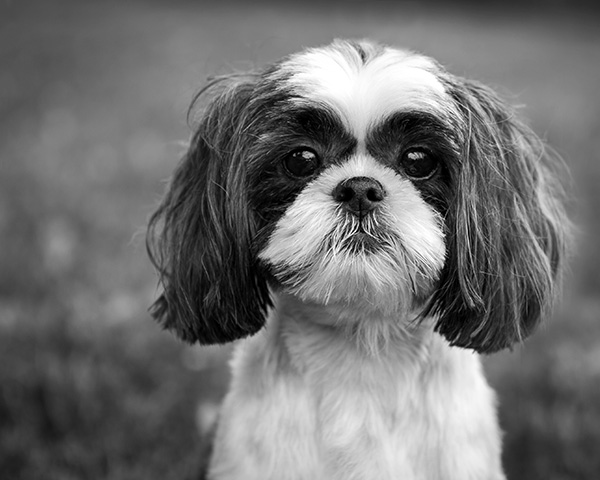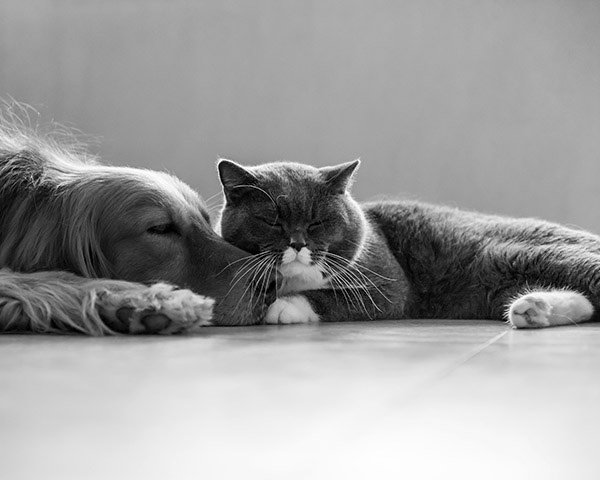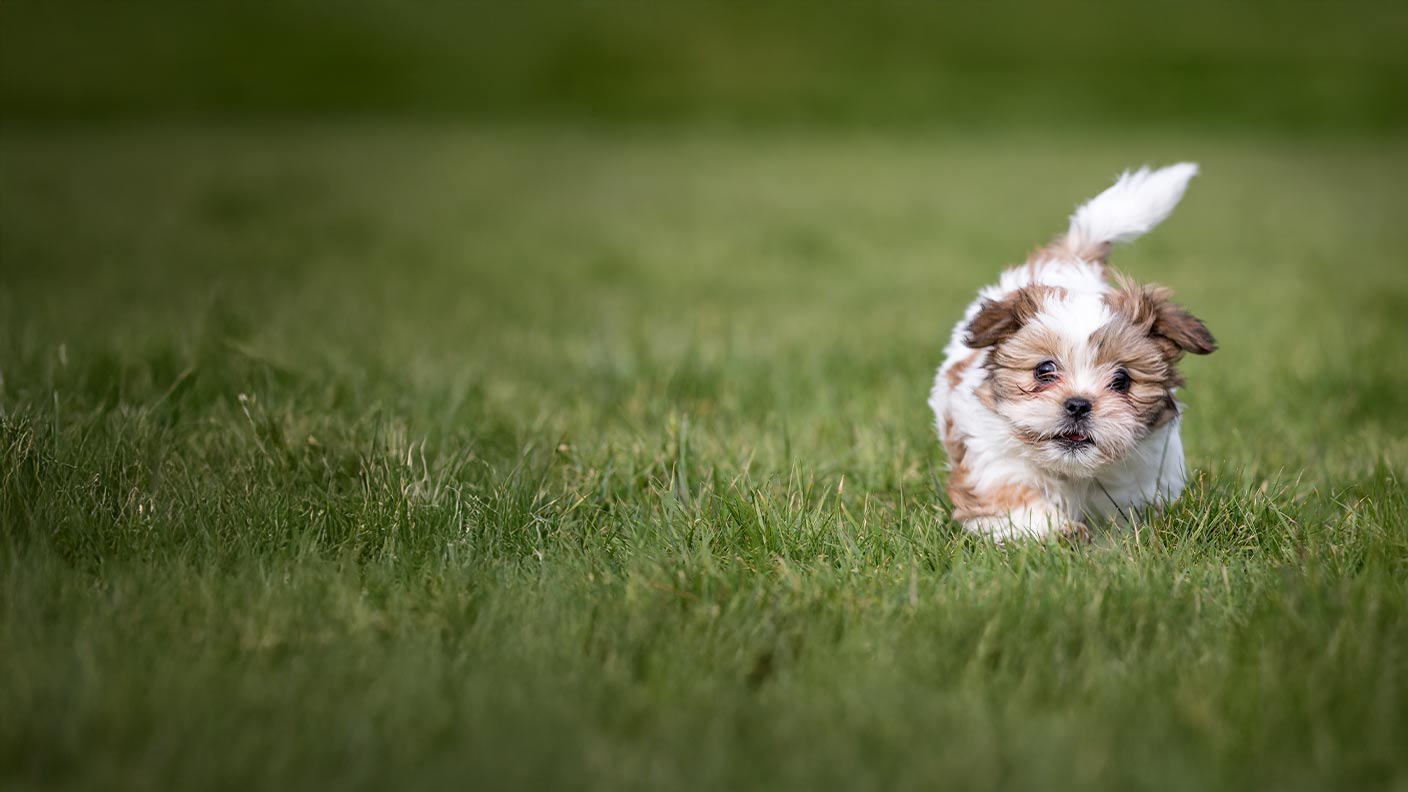Shih Tzu dog breed information and advice
With their affectionate personality and big puppy dog eyes, Shih Tzu dogs have been charming their owners for more than 1000 years.
If you want to get a Shih Tzu of your own, this handy guide has all the Shih Tzu facts, information and advice you need. From common health problems and life expectancy to training and temperament, you’ll know how to take care of a Shih Tzu puppy or dog in no time.
Shih Tzu types and breeds
The purebred Shih Tzu originally came from the autonomous Chinese region of Tibet. And their history goes back more than 1,000 years, when it’s believed the dogs were gifted by Tibet to the Chinese royalty.
This royal little companion was originally known as the 'Lhasa Lion' dog. And when Shih Tzus first arrived here in the UK, they were classed as Lhasa Apsos before becoming their own separate breed.
Smaller varieties of Shih Tzu are sometimes known as teacup or imperial Shih Tzus – but these are not standalone breeds. Over the years though, the Shih Tzu has been successfully mixed with various other dog breeds to create popular crossbreeds.
These include the Shinese (a cross with a Pekingese), the Shorkie (a cross with a Yorkshire Terrier) and a Shih-poo (a cross with a poodle ).
Shih Tzu facts

| Lifespan | 10 - 16 years |
| How much | £500 - £2,000 |
| Size | 27 cm |
| Weight | 4.5 - 8 kg |
| Colours | black, blue, brindle, gold, liver, red, silver |
| Grooming | regular grooming is essential |
| Temperament | affectionate and cuddly |
| Exercise | 30 minutes to one hour per day |
Insurance for your Shih Tzu
When you take out pet insurance for your Shih Tzu, you can be confident that your pet will be well cared for if they’re ever injured or ill. Pet insurance protects you financially, so you won’t be unexpectedly out of pocket if you need to pay a vet bill.
Sainsbury’s Bank Pet Insurance
With Sainsbury's Bank dog Insurance, we can insure your Shih Tzu from eight weeks of age.
Please note that we wont cover any pre-existing conditions and that terms, conditions, excesses, exclusions and limitations apply.
How to care for a Shih Tzu
Feeding, grooming, socialising and exercising are all important things to consider when caring for any dog. Giving your Shih Tzu lots of love and attention will ensure they live a long, happy and healthy life.
Feeding and nutrition
You'll need to feed your Shih Tzu puppy three or four times a day for the first six months. As your puppy grows, you can reduce the number of times you feed it.
As an adult, you’ll only need to feed a Shih Tzu twice a day. It's usually best to continue feeding your puppy the same food as the breeder until they're settled. Then you can look to change it but, remember to do this gradually to avoid a poorly tummy.
It can be confusing to know which dog food is best for your Shih Tzu. Smaller dogs may require different food from larger ones, so do some research before deciding on the best option. Speak to your vet if you are unsure. They’ll be able to recommend the best diet.
Grooming
Shih Tzus have a double coat with a short, dense undercoat and longer topcoat. This requires regular grooming. If you have a puppy, start grooming them at an early age so they get used to it quickly.
If your Shih Tzu has a particularly long coat, you’ll need to groom it every day to prevent the hair from matting. A matted coat can be very unpleasant for your dog. If you’re not sure how to groom your Shih Tzu, it can be easier to visit a dog groomer. They can give them a haircut, trim their face and tackle their claws at the same time. This makes grooming much easier for you and less stressful for your dog.
Bathing your Shih Tzu is also an important part of keeping your pet’s coat clean and their skin healthy. Generally, a quick bath every few weeks should do the trick.
Exercise
Shih Tzus are a lively breed and will need plenty of exercise each day to keep them active and healthy. They’re only small, but a Shih Tzu will still need exercising for 30 minutes, twice a day.
Shih Tzus are also known for being very agile, so you could set up some simple obstacles in your garden. This will ensure your dog gets the exercise they need while having fun in the process.
Training
Shih Tzus can be a bit of a handful to train and are known for their stubbornness. However, they’re intelligent and enjoy learning, so stick at it.
House training a Shih Tzu puppy can also take a little longer than other breeds. Puppies need to go to the toilet every couple of hours. Take your puppy outside when they wake up and after eating or drinking – this will help them learn where to go to the toilet.
Puppy pads are a great way of encouraging your puppy to go to the toilet in a specific place. Once they learn to use the pad in the house, you can then gradually move it outside and, eventually, remove the pad completely.
Temperament and behaviour
Shih Tzus are intelligent dogs with lively, sassy personalities. They’re affectionate, loyal and make great companions. These characteristics mean they’re a great breed to have around the family.
As with some small breed dogs, they can be a bit ‘yappy’ without proper training. If you want to learn how to get a Shih Tzu to stop barking, getting advice from a specialist dog trainer might help. A top tip is to distract your dog with its favourite toy when it becomes vocal and reward them when they’re quiet.
Common health problems
Shih Tzus are known to suffer from several health problems. You may have heard of ‘Imperial’ or ‘Teacup’ Shih Tzus. These are smaller than the Kennel Club’s Breed Standard. They’re unnaturally small and unfortunately, tend to have lots of health problems.
Here are some of the more common health problems that might affect Shih Tzus:
Brachycephalic airway obstruction syndrome (BAOS)
BAOS is a condition only found in brachycephalic breeds. These are breeds that have particularly short noses, making breathing difficult. It’s a congenital condition which means dogs are born with it. Shih Tzus are brachycephalic so can be affected.
The condition also results in noisy breathing and sometimes loud snoring when they’re asleep. In severe cases, dogs can suffer from a lack of oxygen which means they struggle to even do gentle exercise.
Surgery is possible, but your vet will be able to advise you of the best treatment for your dog.
Dental disease
Shih Tzus have short jaws which means their teeth can become overcrowded. This can cause problems with their teeth and gums.
Periodontal disease, also known as gum disease, is common in this breed. This will eventually lead to tooth loss if it’s not treated.
You can help prevent dental disease by cleaning your dog’s teeth from an early age. However, if your dog does have dental disease, your vet might need to remove some of your dog’s teeth.
Generalised progressive retinal atrophy (GPRA, or PRA)
GPRA is an inherited condition of the eyes. If your dog develops GPRA, you might notice them struggling to see properly in poor light or the dark. This can make your dog nervous about going outside when it's dark. You might also notice your dog’s eyes going grey and looking cloudy.
Kidney dysplasia
Kidney (renal) dysplasia is an inherited condition where the kidneys don’t develop properly. Unfortunately, this condition can’t be treated. Shih Tzus with this condition might drink excessively and go to the toilet more often than usual. Other signs might include weight loss or poor growth in younger dogs.
When you buy a puppy, it’s important to find out if the puppy’s parents have had their kidneys checked out to make sure they’re normal. This will lessen the chances of your puppy inheriting the condition.
So, is a Shih Tzu right for you?
Shih Tzus are a small breed of dog and love nothing more than sitting on your lap for a cuddle. They’re intelligent and love company which makes them a great family pet. However, they can take longer to train than other dog breeds and can be quite yappy.
Do Shih Tzus shed their hair?
All dog breeds shed their hair to a certain degree, and Shih Tzus are no exception. But, they do have a ‘double’ coat which means most of their shed hairs get caught in the coat and not much falls out on the floor. Unfortunately, this doesn’t mean they’re hypoallergenic, so if you suffer from a dog allergy, bear this in mind if you’re thinking of getting one.
How much does a Shih Tzu cost?
A Shih Tzu puppy can cost between £500 and £2,000. If you’re buying a puppy, it’s advisable to buy one from a registered breeder. Reputable Shih Tzu breeders will have ensured the puppy’s parents have had all the relevant health checks.
How big do Shih Tzus get?
They’re usually fully grown when they reach about 10-12 months old. When they’re fully grown, they’re around 27cm tall. Imperial Shih Tzus, also known as Toy or Mini Shih Tzus, are usually under 4.5kg and their size can vary.
What is the life expectancy of a Shih Tzu?
Like most small dog breeds, Shih Tzus have a long life expectancy compared to larger breeds. Healthy Shih Tzus can be expected to live between 12 and 16 years, although the oldest recorded Shih Tzu lived to be 23 years old.
Frequently asked questions
Is a Shih Tzu a good family dog?
With affectionate personalities and loyal temperaments, Shih Tzus can make good family pets. They are also known for being friendly with children, and their small size means they’re easy to have around the home. But don’t let their small size deceive you, Shih Tzus do still need plenty of training and exercise.
Is a Shih Tzu a low maintenance dog?
Although they are small, Shih Tzus have large personalities. They can be more difficult to train than other breeds, and their long coats also require regular brushing and grooming which can make them higher maintenance than some short coated breeds.
Are Shih Tzus easy to train?
Shih Tzus are intelligent and love learning new things, but they can also be stubborn and wilful. The key is consistency and patience. Learn what motivates them – whether it’s their favourite treat or toy – and use this to encourage good behaviour.

Browse our guides
Choose from our list of helpful guides and information

Explore dog breeds
Find out how to keep your dog healthy and happy

Cat breed guides
How to care for your cat, common health problems and more
References
Content provided from Vetstream's Vetlexicon Canis - www.vetstream.com/treat/canis 
Dennis E Brooks, David L Williams (online) Proptosis / prolapse orbit / globe. In: Vetlexicon Canis. Vetstream Ltd, UK. Website: https://www.vetstream.com/treat/canis/diseases/proptosis-prolapse-orbit-globe. 
Dennis E Brooks, David L Williams, David Gould (online) Retina: generalized progressive retinal atrophy. In: Vetlexicon Canis. Vetstream Ltd, UK. Website: https://www.vetstream.com/treat/canis/diseases/retina-generalized-progressive-retinal-atrophy. 
Vetstream Ltd (online) Brachycephalic upper airway obstruction syndrome (BUAOS) Owner Factsheet. In: Vetlexicon Canis. Vetstream Ltd, UK. Website: https://www.vetstream.com/clinical-reference/canis/owner-factsheets/brachycephalic-upper-airway-obstruction-syndrome-(buaos). 
Vetstream Ltd (online) Dental disease Owner Factsheet. In: Vetlexicon Canis. Vetstream Ltd, UK. Website: https://www.vetstream.com/treat/canis/owner-factsheets/dental-disease. 
Vetstream Ltd (online) Kidney: dysplasia. In: Vetlexicon Canis. Vetstream Ltd, UK. Website: https://www.vetstream.com/treat/canis/diseases/kidney-dysplasia. 
Vetstream Ltd (online) Periodontal disease and how to prevent it Owner Factsheet. In: Vetlexicon Canis. Vetstream Ltd, UK. Website: https://www.vetstream.com/treat/canis/owner-factsheets/periodontal-disease-and-how-to-prevent-it. 
Vetstream Ltd (online) Progressive retinal atrophy (PRA) Owner Factsheet. In: Vetlexicon Canis. Vetstream Ltd, UK. Website: https://www.vetstream.com/treat/canis/owner-factsheets/progessive-retinal-atrophy-(pra). 
Vetstream Ltd (online) Shih Tzu.. In: Vetlexicon Canis. Vetstream Ltd, UK. Website: https://www.vetstream.com/treat/canis/breeds-pages/shih-tzu. 
Terms and conditions
Important information
* The discount is based on information related to you and the Sainsbury’s and Sainsbury’s Bank transactions linked to your Nectar account. For more information on how we use your data, go to sainsburysbank.co.uk/privacy
Sainsbury's Bank plc, Registered Office, 33 Charterhouse Street, London, EC1M 6HA (registered in England and Wales, no 3279730) is authorised by the Prudential Regulation Authority and regulated by the Financial Conduct Authority and the Prudential Regulation Authority (register no. 184514).
Sainsbury's Supermarkets Ltd is an appointed representative of Sainsbury's Bank plc. Sainsbury's Bank plc acts as an introducer to Pinnacle Insurance Ltd who is authorised by the Prudential Regulation Authority and regulated by the Financial Conduct Authority and the Prudential Regulation Authority (register number 110866). Registered office: 4th Floor, Limelight, Elstree Way, Borehamwood, Hertfordshire, WD6 1JH. Sainsbury’s Bank Pet Insurance is arranged, administered and underwritten by Pinnacle Insurance Ltd. Sainsbury's Bank plc and Pinnacle Insurance Ltd are not part of the same corporate group.
We do not provide personal recommendations to customers.
